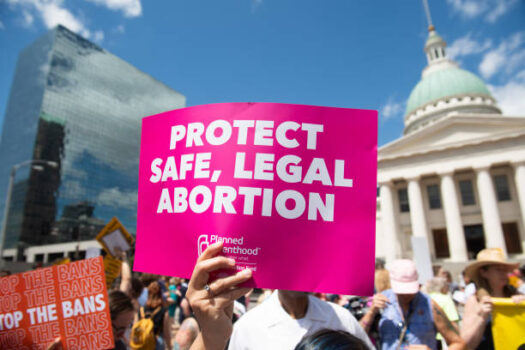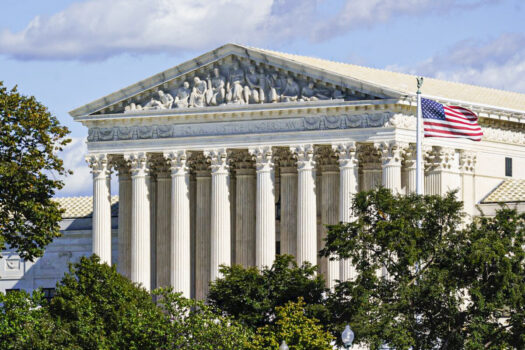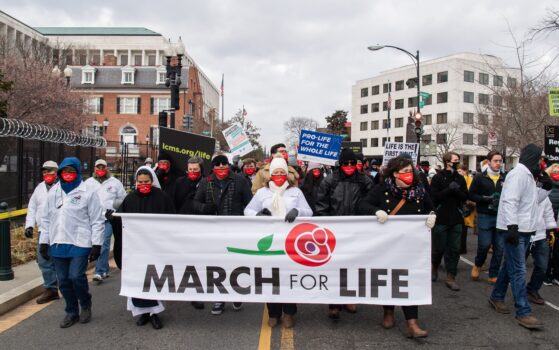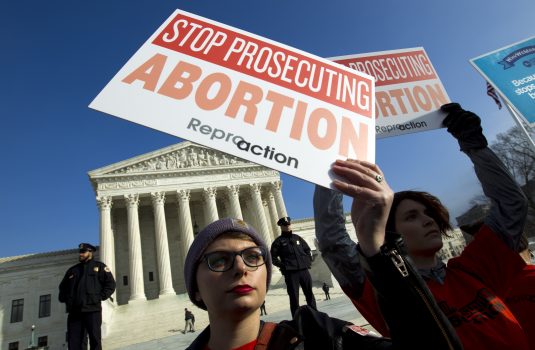Kansas, Kentucky Set to Be First ‘Ballot Tests’ in Post-Roe America
A post-Roe world is being assembled by state legislatures across the country in anticipation of the United States Supreme Court in June or July overturning its 1973 Roe v Wade ruling that established the constitutional right to abortion.
All sides of the abortion debate expect the court to uphold a Mississippi law that bans abortion after 15 weeks of pregnancy when it rules on Dobbs v. Jackson Women’s Health Organization, and to return regulation of abortion to the states.
Lawmakers in state capitals nationwide have been revising state abortion laws and regulations over the past two years to prepare for Roe, which allowed abortions up to 22-24 weeks, being struck down.
According to the Guttmacher Institute, a research and policy nonprofit that supports abortion rights, at least 531 “anti-abortion restrictions” were introduced in 40 states during 2022 sessions after lawmakers in 2021 adopted more than 100 laws restricting abortion, the most in any year in the past five decades.

At least 26 states are likely to either ban abortion outright or severely limit access to the procedure, the Guttmacher Institute maintains, if the Supreme Court returns the issue to states, as expected. According to Congressional Quarterly/Fiscal Note, at least 12 states have adopted “trigger bans,” which would instantly prohibit abortion in their state if the court overturns Roe or sends it back to the states.
Lawmakers in Arizona, Florida, West Virginia, and Idaho are among state lawmakers who have adopted—or are considering doing so in 2022 sessions—15-week bans similar to Mississippi’s while Idaho is among Republican-controlled legislatures that had adopted bills similar to Texas’ 2021 law that allows anyone to file lawsuits against anyone who knowingly “aids or abets” an abortion after the sixth week of pregnancy.
Meanwhile, progressive-controlled states, such as New Jersey and Vermont, have gone in the opposite direction in passing measures that protect access to abortion.
On March 22, California’s Democratic Gov. Gavin Newsom signed into law a bill that would make abortions less expensive for private insurance plans, the first a raft of legislation the state’s assembly is crafting in anticipation of Roe’s demise.
Abortion opponents across a handful of states have taken a different route—or a course complementary to legislative initiatives—by going directly to the people with proposed constitutional amendments addressing abortion.
Voters in four states have approved ballot measures that declare there is “no right to abortion” in their state constitutions.
Tennessee was the first to do so in 2014 with Alabama and West Virginia voters doing so in 2018. Louisianans adopted their “no right to abortion in state constitution” ballot measure in 2020.

At least two similar state constitutional amendments will go before voters this year in Kansas and Kentucky, with a prospective third measure being debated now by Oklahoma lawmakers. Voters in Iowa will see a “no right to abortion in state constitution” ballot measure in 2024.
The proposed Kansas No Right to Abortion in Constitution was placed on the ballot by lawmakers following two-thirds supermajority votes in both chambers of the legislature in January 2021. It will go before voters on Aug. 2.
A “yes” vote would amend the Kansas Constitution to say nothing in the state constitution creates a right to abortion or requires government funding for abortion and that the state legislature has the authority to pass laws regarding abortion.
That legislative authority is a huge issue after the state’s Supreme Court overturned the 2015 ‘Kansas Unborn Child Protection from Dismemberment Abortion Act’ in its 2019 Hodes & Nauser, MDs, PA v. Schmidt ruling, which held Section 1 of the state Constitution’s Bill of Rights protects a woman’s right to abortion, making Kansas one of 10 states where the right to abortion was granted by court rulings.
“Kansas is in a unique position regardless what happens at the federal level,” Kansans for Life director of communications Danielle Underwood said.
“If the U.S. Supreme Court does anything to give states more flexibility [in June or July], that 2019 ruling would still restrict what Kansas can do in placing restrictions on the abortion industry.”
In fact, she said, even the Guttmacher Institute has acknowledged “the state of Kansas is about to become a destination state for the abortion industry to push women to.
Kansas is an unprotected territory, a haven for taxpayer-funded, late-term abortions. They will both be allowed post-Roe” unless voters adopt the Value Them Both Amendment.

Underwood said the campaign in support of the proposed constitutional amendment is gearing up with Kansans For Life joining the Kansas Catholic Conference and Kansas Family Voice in a swelling coalition dedicated “to preserve our existing right-to-life laws.”
“We’re mobilizing the largest grassroots effort in Kansas history,” she said. “We are working through over 1000 churches in the state and making sure we get the word out to Kansans about what is at stake.”
With the measure going before voters on Aug. 2, Underwood said “Kansas will be the first ballot test” after the Supreme Court hands down its ruling in June or July.
“The legislators did their part and now it is up to the people of Kansas to make sure we do our part to ensure Kansas does not remain a destination state for abortions,” she said.
“This is all hands on deck. It is such an intense battle in Kansas. It is absolutely critical that we pass this amendment.”
The stakes are similar in Kentucky, where Kentucky Right to Life executive director Addia Wuchner is spearheading a growing YesForLifeKY.com coalition in supporting a November measure placed on the ballot this month by state lawmakers that would declare there is no right to abortion under the state’s constitution.
“The time is right,” she said. “We wanted to bring this forward.”
A career registered nurse and former seven-term Republican state House rep who chaired the chamber’s Health and Family Services Committee, Wuchner has been Kentucky Right to Life executive director since 2019.
In 2018, Wuchner was among the lead sponsors of The Human Rights of the Child Act, which banned an abortion method that dismembers the fetus. That bill was adopted but blocked by rulings in the 6th Circuit Court of Appeals.
“We passed the bill 2018 human rights bill barring the dismemberment of abortion, a very gruesome form of abortion, and have been in the courts fighting since 2018,” she said.

“This is a law that is representative of the values of the people of Kentucky. It got 106 of 138 House votes. It represents the views of Kentucky.”
However, then-Kentucky attorney general, and now Democratic Gov. Andy Beshear opted not to defend the law or challenge rulings that the state was legally prohibited from doing so.
Beshear in 2019 appointed Republican Daniel Cameron to succeed him—Cameron was elected to the post in 2020—who has taken the case to the U.S. Supreme Court where, on March 3, it ruled the state could defend the law in court.
Cameron said “he would fight it to the Supreme Court. He is a man of his word,” Wuchner said.
“The attorney general has the right to defend that bill so you can see how important that is for state courts now that are waiting for decisions on non-discrimination bills, heartbeat bills. Waiting on the courts to decide.
“As the courts were starting to change,” she continued, “and as we looked at the Kentucky Constitution, we wanted to make sure we didn’t see the same thing in Kentucky that we saw in the federal court system, in the U.S. Supreme Court, [where judges] interpret the law beyond the legislators’ intent.”
Regardless how the U.S. Supreme Court rules, “We want to make sure the state Constitution reflects the will of the people of the state of Kentucky so there is not any room for misinterpretation.”
Wuchner also praised Kentucky Secretary of State Michael Adams for the way the ballot measure is worded. “He codified our embrace of life in 30 words. It is simple—very, very simple,” she said.
Before filing the proposed constitutional amendment, Wuchner said she spoke with sponsors of Louisiana’s successful 2020 “No Right to Abortion” amendment to discuss “how did they organize? What was their strategic plan? What was their experience? What did they learn?”
Ultimately, she said, measure sponsors decided “rather than just Kentucky Right To Life, let’s do something different” with an extensive outreach that called on diverse groups to “stand together—let’s get the measure passed [by lawmakers] and then form a strategic alliance” to push the ballot measure.
The Yes for Life Alliance includes Kentucky Right to Life, Sisters for Life, The Family Foundation, the Catholic Conference of Kentucky, the Kentucky Baptist Convention, and the Commonwealth Policy Center, among other backers, Wuchner said.
“We know the other side has a lot of money,” she said, predicting a hard-fought battle this summer into fall. “We have one candidate on the ballot, just one special candidate—Amendment 2.”
The response had been enthusiastic with Kentuckians unhappy that courts, not lawmakers, are legislating in their state.
“On Nov. 8, Kentuckians will be able to vote for themselves on a pro-life constitutional amendment,” Wuchner said. “It is a pivotal time in the country and in Kentucky. This is a final piece of the puzzle to move Kentucky forward as pro-life.”

Follow
Source: Kansas, Kentucky Set to Be First ‘Ballot Tests’ in Post-Roe America